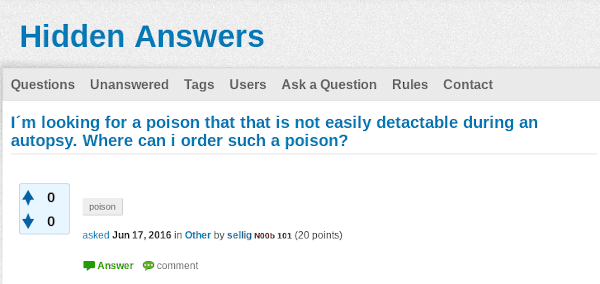Court: Cop Killed Two People with Poison from Alphabay
A Luxembourg police officer allegedly purchased potassium cyanide on the now-defunct Alphabay darkweb market. He used the poison to kill his sister and her husband, according to investigators.
The police officer is facing charges for allegedly poisoning his sister and her husband at his apartment in Bereldange on September 2, 2016. Three days after the victims had collapsed during lunch, experts confirmed the presence of potassium cyanide in both bodies. Law enforcement arrested the 30-year-old the next day. The question posted by the suspect on Hidden Answers
Investigators found that the defendant had been searching for poisons on the internet as early as 2014. He started by purchased ricin seeds. Two years later, his interest in poisons increased significantly. He spent hours researching “food poisoning”, “death by poisoning”, “poisoning with cyanide” and “which poison ensures a sudden and painless death?”
He posted a question on Hidden Answers:
“I’m looking for a poison that is not easily detectable during an autopsy. Where can I order such a poison? " (original question)
On August 10, the defendant joined Alphabay. The Federal Bureau of Investigation provided investigators in Luxembourg with data from the servers seized during the investigation into Alphabay. Using this data, investigators learned the man had purchased a product titled “Botulinum toxin Strong Poison” on August 19 and “Fentanyl” on September 16. The court heard how the suspected murderer had sent Bitcoin to his wallet on Alphabay before making three purchases.
On September 25, the defendant called emergency services about his sister and her partner. He said they had passed out after experiencing difficulty breathing. The paramedics arrived at the man’s apartment too late to save either victim. The former police officer initially told investigators that the duo had arrived at his apartment for lunch after taking a hike and drinking Nocino or walnut liqueur. He said the victims started experiencing general discomfort and then breathing difficulties before passing out. Police searching for evidence near the scene of the crime
Toxicologists learned that both victims had “far beyond the fatal rate” of potassium cyanide in their blood. Neither had been drinking walnut liqueur either, they said. Confronted with this evidence, the defendant changed his story. He admitted he had poisoned them with botulinum toxin but denied using potassium cyanide. While in a different room, he mixed the contents of an unlabeled bottle with alcohol he served to his sister and her companion. He claimed he had only planned to dose them with enough to “give them euphoria.” Experts disputed this claim; they explained that no dose of potassium cyanide or botulinum toxin produces euphoria and the fatal doses are smaller than a grain of sand.
The trial is ongoing. In addition to additional information about the recent deaths, details are expected to surface concerning the suspicious death of the defendant’s mother in 2014.